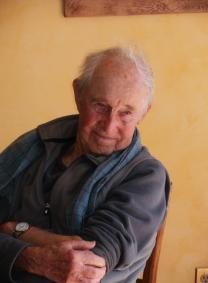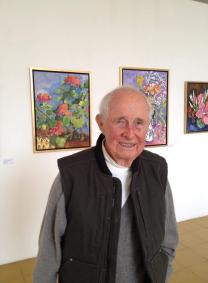Robert Butler, scholar of hearing and auditory spatial localization, 1923-2022

Groundbreaking auditory researcher remembered as thoughtful mentor, extraordinary softball pitcher
By Sarah Steimer
Prof. Emeritus Robert A. Butler, whose research focused on hearing—particularly involving the localization of sound and auditory perception—died Feb. 5 after a brief illness. He was 98 years old.
Remembered as an introspective scientist who always had the best interests of students at heart, Butler was a University of Chicago alum who returned to campus in 1957 as an instructor in the Departments of Surgery (Otolaryngology) and Psychology. Through his decades at UChicago, he brought a sense of joy to everything he did—from softball games with faculty and students, to the research he conducted in his lab.
“Due to my father’s fascination with his work, I always associated ‘work’ with something exciting and meaningful,” said Cathy Avery, one of Butler’s four daughters. “My dad would frequently go into the lab on weekends, particularly when he worked with monkeys, and I never got the impression that he resented this responsibility. In fact, it all seemed quite exciting and important.”
Butler was raised in Miami and graduated from the University of Florida. After serving in the Navy during World War II, he obtained a Ph.D. in psychology from the University of Chicago and accepted his first academic job at the University of Wisconsin–Madison.
During his time at Wisconsin, Butler studied animal behavior using monkeys. The work was the basis for an article published in Scientific American in 1954, titled “Curiosity in Monkeys,” which detailed how this inquisitiveness trait may be a more fundamental part of the primates’ make-up than previously thought.
At UChicago, his focus on the auditory system deepened and expanded. Butler’s contribution to the field was his finding that people could make vertical distinctions of location based upon temporal frequency. For instance, he found that a high-pitch sound appears higher in the visual in space. He also determined that it’s optimal to have a broad spectrum of sound—and not just a pure, single frequency—when it comes to locating sound in space.
His children often got to participate in his research. ”We sat in a special chair in a soundproof room, and told him what speakers the sound was coming from,” daughter Ann Zimrin said. “We were paid with ice cream bars from the vending machine in the hospital basement, which was quite a treat.”
Joel Pokorny, a professor emeritus in the Biological Sciences Division, recalled many moments sitting in just such a booth during the sound experiments. Pokorny co-taught a course with Butler in the early 1970s that looked for the differences and similarities between the way the auditory system processes sensory information and how the visual system processes and transmits information.
“Bob was a very introspective philosophical scientist,” Pokorny said. “It was marvelous interacting with him. It was a really terrific experience for me as a younger scientist.”
Butler was chairman of the Department of Behavioral Science from 1979 to 1982 and acting chairman of the Section of Otolaryngology from 1983 to 1984. He served as professor emeritus in the Department of Surgery (Otolaryngology) and Behavioral Sciences from 1984 on.
Steven Shevell, a professor in the Department of Psychology, interacted with Butler mostly through student issues, participating together on various committees. “He always had the students’ best interests at heart,” Shevell said. “It was never about what was expedient or what was easily integrated into existing University de facto procedures. But instead: What should be done for the students? That was something I always appreciated about him.”
Alan Musicant, Butler’s last Ph.D. student and professor emeritus at Middle Tennessee State University, continued Bob’s work on the role of spectral cues in auditory spatial localization. “In January 1978, I was in the process of applying to work with him as a doctoral student at the University of Chicago,” Musicant said. “One night I received an unexpected phone call. Bob was calling me to learn more about who I was. This direct approach was a hallmark of him as an individual.”
In addition to his roles at the university, Butler was a member of numerous scholarly organizations. He served as an advisor on the Committee on Hearing Bioacoustics, and Biomechanics, along with the Deafness and other Communicative Disorders Program Advisory Committee for the National Institutes of Health. He was also a member of the American Otological Society, served as president of the Association for Research in Otolaryngology, and was a fellow at the Acoustical Society of America.
Butler was also remembered as an athlete: He played in and led softball teams made of students and faculty—one of which was named “Bob’s Butlers.”
“I would go to the games and loved to watch the teasing that went back and forth as they referred to him as ‘old man,’ but clearly respected his unique pitching style,” Avery said. Shevell echoed the memory of Butler’s pitching technique, saying that he would throw it with such a steep arc that it looked to be moving vertically—but the ball would still cross the plate in the strike zone. And no one could seem to hit it.
Butler became a runner at age 55, winning the St. Louis marathon for his age group in 1981. Shevell remembers running in a race with his own running partner, casually chatting as they went, when Butler passed them in the final half mile with a friendly quip: They’d run a lot faster if they didn’t talk.
“He was about 20 years older than we were and he was passing us at the end of the run,” Shevell said. “But he was mostly concerned that we didn't have this serious ethic and what it takes to be a winning runner. That's all in good spirit, of course.”
Taking a deep interest in everything he did and everyone he met was typical for Butler. His daughters remember his keen interest in any visitor they brought to the family home. Once he retired from the University, he and his wife Caroline moved to the farm they’d purchased in Wisconsin. Both enjoyed staying busy: They became cattle farmers, learning to mow fields, rotate the cattle, and deal with calves that couldn’t nurse or cows that rejected their calves. Yet much like his scholarly work, it was a labor of love.
“I believe that all of his daughters have chosen meaningful and challenging careers—professor, physician, clinical psychologist and attorney—based on our lifelong observations of my father and his love of research and teaching,” Avery said.
“The memory of my father that I think about often is his description of his work,” Zimrin said. “He said he thought up interesting questions and then spent his time in the lab finding the answers to them. That struck me as such a wonderful way to spend one’s life, and it set me off on my path to academic medicine.”
Butler is survived by his wife Caroline Butler; his four daughters Amy Butler, Ann Zimrin, Cathy Avery, and Elizabeth Butler; two sons-in-law; eight grandchildren; and two great-grandchildren.
 THE UNIVERSITY OF CHICAGO
THE UNIVERSITY OF CHICAGO



